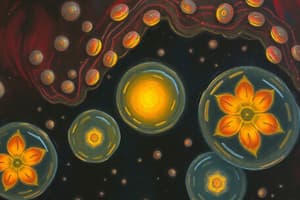Podcast
Questions and Answers
The plasma membrane is impermeable to certain substances.
The plasma membrane is impermeable to certain substances.
True (A)
The nucleus is responsible for generating energy for the cell.
The nucleus is responsible for generating energy for the cell.
False (B)
Ribosomes are found only in the cytoplasm.
Ribosomes are found only in the cytoplasm.
True (A)
Lysosomes are involved in protein synthesis.
Lysosomes are involved in protein synthesis.
Passive transport requires energy expenditure.
Passive transport requires energy expenditure.
Carrier proteins are involved in active transport.
Carrier proteins are involved in active transport.
The Golgi apparatus is involved in protein synthesis.
The Golgi apparatus is involved in protein synthesis.
Mitochondria are involved in protein synthesis.
Mitochondria are involved in protein synthesis.
Cytoskeleton provides structural support to the cell.
Cytoskeleton provides structural support to the cell.
The endoplasmic reticulum is involved in waste management.
The endoplasmic reticulum is involved in waste management.
Lysosomes contain digestive enzymes that break down cellular waste.
Lysosomes contain digestive enzymes that break down cellular waste.
The nucleus is responsible for signaling in the cell.
The nucleus is responsible for signaling in the cell.
Flashcards are hidden until you start studying
Study Notes
Structure and Components
- Plasma membrane: semi-permeable membrane that surrounds the cell, regulates what enters and leaves
- Cytoplasm: jelly-like substance inside the cell membrane, contains water, salts, sugars, and organelles
- Nucleus: control center of the cell, contains DNA
- Mitochondria: powerhouses of the cell, generate energy through cellular respiration
- Endoplasmic reticulum (ER): network of membranous tubules and cisternae, involved in protein synthesis and transport
- Ribosomes: small organelles found throughout the cytoplasm, responsible for protein synthesis
- Lysosomes: membrane-bound sacs containing digestive enzymes, break down and recycle cellular waste
- Golgi apparatus: complex of flattened sacs and tubules, involved in protein modification and packaging
Cellular Organelles
- Centrioles: small, cylindrical organelles involved in the formation of cilia, flagella, and spindle fibers
- Cilia and flagella: hair-like structures that aid in movement and sensing the environment
- Peroxisomes: small organelles involved in the breakdown of fatty acids and amino acids
- Chloroplasts: found in plant cells, responsible for photosynthesis
- Vacuoles: membrane-bound sacs that store water, salts, and other substances
Cellular Functions
- Metabolism: process of converting energy and nutrients into the components that make up living organisms
- Cell signaling: process by which cells communicate with each other through signaling pathways
- Cell growth and division: process of cell growth, DNA replication, and cell division
- Cell death: process of programmed cell death, also known as apoptosis
Cellular Transport
- Passive transport: movement of molecules from high to low concentration without energy expenditure
- Diffusion: random movement of molecules from high to low concentration
- Osmosis: movement of water from high to low concentration
- Active transport: movement of molecules from low to high concentration with energy expenditure
- Carrier proteins: transport molecules across the cell membrane
- Pumps: transport molecules across the cell membrane using energy
Studying That Suits You
Use AI to generate personalized quizzes and flashcards to suit your learning preferences.




